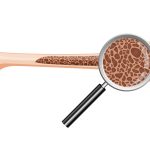Eczema can impact your skin, but with the right care, you can reduce symptoms
As the human body’s largest organ, the skin can be both resilient and sensitive. One day your skin is flawless and glowing, the next week, you may wake up to a rash or inexplicable acne. One such condition that often affects the skin sensitively is eczema (also known as atopic dermatitis).
Quick Read:
- This condition results in dry, itchy, and red skin patches.
- These patches often appear behind your knees, on your face, inside elbows, and on your hands and feet.
- Eczema triggers typically include factors like allergies and environmental elements.
How does eczema start?
First, we have some good news. This skin condition isn’t contagious, so there is no need to worry about passing it on to others. It can be frustrating, though, as the flare-ups can be unpredictable, ranging from skin dryness and cracks to rashes and oozing. Eczema can affect a person periodically or, in some cases, for the long term. It’s a skin issue that is usually common in children, but adults are also vulnerable. The inflammation behind eczema stems from a mix of factors:
- People with eczema often have an immune system that overreacts to allergens or irritants. If you have asthma or allergies, you could be at higher risk.
- Genetics and family history play a role. If your relatives have dermatitis, you’re more likely to develop it too.
- Are you constantly exposed to smoke, air pollution, and harsh soaps? These factors could contribute to eczema risk, as well as certain fabrics like wool, dry air, and extreme heat.
- Emotional stress can also worsen eczema or even cause an outbreak.
Another culprit: filaggrin
Have you heard of filaggrin? Filaggrin is a protein that helps our bodies maintain a healthy, protective barrier on the very top layer of our skin. Without enough filaggrin, we lose moisture in our skin. Bacteria and viruses can then creep into the skin. Many people with eczema have dry and infection-prone skin.

Home remedies to keep eczema at bay
Although eczema can be a lifelong condition, you can manage the symptoms. For now, there’s no permanent cure, but a combination of home remedies, over-the-counter medications, and prescribed treatments can bring relief.
- Choose moisture-rich skin creams or lotions to keep your skin well-hydrated. Aim to apply these products at least twice a day.
- Ask a pharmacist about topical treatments and medications, such as anti-itch creams, antihistamines, or natural skin helpers to provide relief from discomfort and irritation.
- If possible, look into light therapy, which is done under medical supervision. Light therapy can help reduce eczema flare-ups.
- Stick to a consistent skincare routine to help prevent eczema episodes and manage existing symptoms.
- Do your best not to scratch! Scratching can make the irritation worse and leave scars, so instead, gently press on the itchy areas to help relieve discomfort.
- Apply bandages over the affected areas to protect your skin from further irritation and reduce the urge to scratch.
- Sweet scents may be tempting, but avoid heavily scented soaps and lotions, as fragrances can irritate eczema-prone skin. Opt for fragrance-free skincare products.
- A warm bath helps soothe the skin, but be sure to rinse off soap thoroughly and moisturise while your skin is still damp.
- Use a humidifier to prevent your skin from drying out in overly warm, dry indoor environments.
- In hot weather, wear lightweight, smooth-textured clothing to avoid irritation.
- Find ways to relax and reduce stress, as your emotional wellbeing can influence the severity of eczema.
Take the time to learn how to manage eczema triggers and stick to a careful skincare routine. If the symptoms persist or worsen, see a doctor for more targeted help.
Images: Vecteezy/Pixabay





















